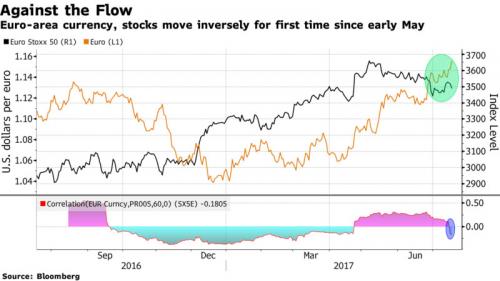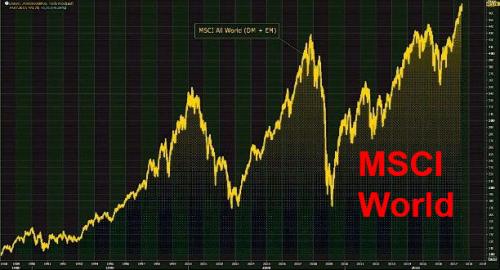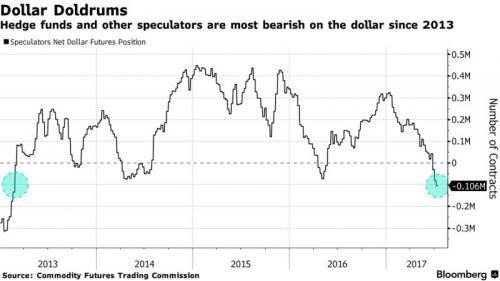In what has been a less exciting session than the previous two, the euro retraced some recent gains as traders grew concerned they may have overestimated the ECB’s hawkish bias ahead of Thursday’s rate decision; in turn the dollar edged higher after the collapse of the GOP healthcare bill sent it to the lowest since September on Tuesday.
Not even Citi could infuse any excitement in the overnight session, which its called “Purgatorial”:
Markets are more or less flat so far today as we face a temporary dearth of data and speakers. USD remains weak, but there has been no real excuse to continue selling yet. The ECB and the BoJ are both up tomorrow and any potential moves may be linked to pre-positioning/squaring rather than anything that today may offer us…
There is little of note this afternoon that could tickle the fancy of even the most excitable FX watcher – We are staring into the abyss… and DoE inventories are staring right back. As oil is flat so far today, that print could provoke a small twitch. Elsewhere, we get US housing starts and Canadian manufacturing shipments…
In Dante’s inferno, Purgatorio immediately precedes Paradiso. Fingers’ firmly crossed.
European equities got a boost from both the weaker euro and from corporate results, while oil fluctuated and gold fell. The Stoxx Europe 600 gained 0.3% in early trading after falling 1.1% Tuesday, its largest drop this month as concerns emerged that the stronger Euro would pressure exporters, leading to the first decoupling between the EUR/USD and the Stoxx in two months.

S&P 500 futures were little changed (up 0.05%) after the cash index closed at another record on Tuesday.
With the USD just off 10-month lows, there continues to be an easing of loosening of financial conditions for emerging markets which also supports equities. After decent gains in Asia on the back of positive signs from China this week, MSCI’s world stocks index looked set for a ninth day of gains which would mark its longest winning streak since October 2015.

Cited by Reuters, Marijke Zewuster, Head EM research at ABN AMRO said “Most emerging markets are doing quite well at the moment, especially in Asia. The figures for China are positive. If you look at the underlying figures they are relatively strong at the moment.”
In Asia, MSCI’s index of Asia-Pacific shares outside Japan and its index of emerging market shares were both up 0.5 percent at their highest since April 2015. China’s Monday fireworks were long forgotten, with the CSI 300 index leading winners as mainland stocks rallied sending the Shanghai Composite and ChiNext higher by 1.4% and 1% respectively. Hong Kong’s Hang Seng Index was up 0.6 percent. Japan’s Topix Index swung between gains and losses, while South Korea’s Kospi Index rose 0.2 percent. The Yuan weakened for first time in eight days despite strongest daily fixing since October; seven-day repo falls five basis points after PBOC injects 100 billion yuan of liquidity. Following Tuesday’s unexpectedly hawkish RBA announcement, Australian bonds were firmer with the 10-year yield dropping 3 bps. Australia’s S&P/ASX 200 Index rose 0.8 percent as bank shares climbed. Analysts said new capital requirements looked fairly benign.
The U.S. dollar, which dropped sharply on Tuesday after the collapse of the GOP healthcare bill, managed a modest rebound on Wednesday. Against a basket of other major currencies, it was up 0.3 percent at 94.878, but still down around 7 percent on the year and within sight of Tuesday’s low of 94.476. The modest USD gains were due to expectations the European Central Bank and the Bank of Japan may strike dovish tones when they meet on Thursday which could dent recent strength in the euro and the Japanese Yen. Meanwhile, the bearish pileup continues, with hedge funds most bearish on the dollar since 2013.

On Thursday, the ECB is expected to adjust their language but substantive changes to their policy will likely come later in the year. The BOJ is expected to raise its growth forecast but cut its inflation outlook, underlining the cautious tone adopted recently by major central banks.
Emerging-market stocks climbed for an eighth-straight day to the highest since April 2015, lifted by strong finish for Chinese equities, iron ore futures also +3.7%, helping AUD and NZD marginally outperform with domestic equity markets. MXN initially rallies after S&P raises country’s outlook.
Treasuries pare rally with longer maturities leading declines; 10-year yield +1bp to 2.27%. USD swap spreads are edging wider across the curve, led by 10-year sector as swapped issuance is expected to dry up after the latest wave of financial issuance pricings, tempting fast-money dip buyers. Open interest points to liquidations of longs in 10-year futures into Tuesday’s rally.
In commodities, WTI crude fluctuated before slipping 0.2 percent to $46.29 a barrel after API reported an unexpected rise in inventories on Tuesday; today’s DOE number will be closely watched. Gold dropped 0.3 percent to $1,238.74 an ounce. Iron ore futures jumped 2.6 percent, building on a 7 percent advance over Monday and Tuesday.















No Comments